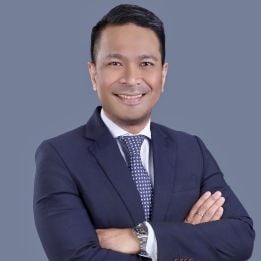

General counsel and senior vice president | Frontiir



Al-Shwaid de Leon Ismael
General counsel and senior vice president | Frontiir
What are the most significant cases or transactions that you and your legal team have recently been involved in?
Under my leadership, Frontiir Group’s Legal and Corporate Affairs team has consistently risen to the challenge of managing complex cross-border transactions in some of the most demanding markets, particularly Myanmar and China. Navigating these intricate deals requires not only deep legal knowledge but also strategic foresight, cultural sensitivity, and a strong collaborative spirit. By leveraging internal expertise and building strategic partnerships, I have guided the team to deliver remarkable results.
Over the past year, we have handled a series of cross-border transactions, including acquisitions and dispositions of investments in Shenzhen, China, as well as collaborative partnerships with leading information and communication technology companies in Thailand and Singapore. These transactions strengthened the Group’s strategic position across Southeast Asia. Each deal required navigating diverse legal and regulatory frameworks while remaining culturally aware and operationally agile. My team undertook due diligence, conducted extensive legal research, prepared and reviewed definitive agreements, and led negotiations with counterparties. Through teamwork and attention to detail, we successfully secured strategic footholds in these key markets.
A cornerstone of our success has been our strategic use of internal resources. I have developed a capable legal team—composed largely of local lawyers—who can handle multi-jurisdictional matters confidently. This approach not only empowers the team but also reduces our reliance on external counsel, creating significant cost savings. Where highly specialized expertise or jurisdictional knowledge is required, I engage external counsel selectively, ensuring a collaborative balance that maximizes value and achieves the best outcomes for the Group.
Drawing on more than sixteen years of experience as a corporate and transactional lawyer, I have led my team through the complexities of these multi-jurisdictional deals while mentoring them in the strategies and value of transactional lawyering. In doing so, I have also redefined the role of in-house counsel to go beyond traditional compliance work, emphasizing strategic foresight, ethical integrity, and innovation. As General Counsel and Senior Vice President of Frontiir, I act as a key business partner, protecting the company from regulatory and reputational risks while supporting its growth as a leading internet service provider in Myanmar. My responsibilities also span risk management, corporate communications, and corporate finance-related matters.
Could you share an example of a time when you came up with an innovation that improved how your legal team works and did not come at a large expense?
I have always believed in my personal mantra, “Making Things Happen, One Initiative at a Time.” This philosophy drives me to pursue innovative ways to enhance efficiency and effectiveness without significantly increasing costs. Over time, I have introduced several initiatives that transformed how the Legal Team operates.
One of my key achievements has been the creation of the Sanctions Compliance Program. Operating in a heavily sanctioned jurisdiction where official information is scarce, I developed a robust and comprehensive framework that utilizes alternative data sources, fosters engagement with industry networks, and employs a custom sanctions alert system. I also spearheaded the development of the “Frontiir Sanctions Database,” which consolidates internal records and ensures ongoing compliance. These measures have enabled the Group to maintain full adherence to international sanctions regulations, avoiding any legal or reputational breaches.
Another initiative I led was Project Keep It Simple and Standard (KISS). This project standardized the Group’s wide range of legal templates, documents, and procedures, ensuring they align with both local and international laws. It has greatly streamlined our contract review process and improved internal efficiency. As part of this work, I also introduced policies governing the responsible use of artificial intelligence in the workplace.
Recognizing the lack of accessible continuing education for Myanmar’s lawyers, I established the Frontiir Legal Academy (FLA) and the Brown Bag Session (BBS). The FLA goes beyond technical legal training, fostering leadership, communication, and subject-matter expertise across various legal fields. The BBS focuses on soft skills and practical learning relevant to daily in-house work, ranging from contract drafting to professional development and communication. To date, I have conducted over twenty-five FLA sessions and more than fifteen BBS sessions, cultivating a culture of excellence and growth within the team.
Finally, to improve efficiency and mitigate risk, I initiated Project Document Management (DM)—a company-wide effort to create a structured and centralized system for managing critical legal documents. This includes developing retention and disposal policies and establishing a single repository for all contracts and legal instruments. Together, these innovations have strengthened our compliance, efficiency, and institutional knowledge—without significant financial burden.
How do you see the general counsel role evolving in Myanmar over the next five to ten years?
Myanmar’s legal environment is undergoing profound transformation, and I believe the role of the General Counsel will evolve in parallel. Traditionally, the GC has been viewed primarily as a compliance officer, but that is rapidly changing. In my view, the GC of the future in Myanmar will be a true strategic partner, integrating legal insight with business leadership.
In my own work, I collaborate closely with the Finance, Network, Corporate Administration, Business Development, and Government Relations teams to design and implement strategies that protect company assets while enabling sustainable growth. This includes contributing to the development of Environmental, Social, and Governance (ESG) policies and ensuring that regulatory compliance supports rather than hinders innovation.
Ethical excellence is also central to this evolution. Through my involvement with the Global Network Initiative, I have championed responsible governance and integrity in business operations. I believe future GCs in Myanmar will increasingly be expected to uphold these principles, advocating for transparency, human rights, and corporate accountability.
I also see the future GC as a knowledge leader and innovator. Initiatives such as my Frontiir Legal Academy and Brown Bag Sessions demonstrate the importance of fostering a culture of continuous learning within the legal function. This approach equips teams to adapt to a fast-changing regulatory and digital environment. As Myanmar embraces global digitalization, GCs will need to harness technology to improve efficiency in contract management, due diligence, and compliance.
Finally, as Myanmar gradually reintegrates into the global economy, GCs must become experts in managing cross-border transactions and navigating international legal frameworks. My experience in these areas underscores how crucial it is to train in-house lawyers to handle global issues and reduce dependence on external advisers. The GC of the next decade will therefore be a strategist, an ethical leader, and an innovator who drives both legal and business excellence.
Which recent political, economic, or regulatory changes have impacted your work the most in recent years?
The past few years have brought unprecedented political and economic upheaval to Myanmar. The 2021 military coup triggered political instability, economic uncertainty, and sweeping changes to the regulatory environment. These conditions have required constant adaptation and creative problem-solving.
One of the most significant challenges has been managing the evolving sanctions regime. Operating in a jurisdiction with limited transparency forced me to move beyond traditional compliance models. I implemented enhanced due diligence procedures, harnessed alternative data sources, and built relationships with industry networks to fill information gaps. I also introduced a custom sanctions alert system that issues regular updates and analysis, helping the business make informed decisions in real time.
The coup also raised urgent human rights and digital freedom concerns, particularly as government restrictions affected access to online platforms such as Facebook. To protect user data and uphold ethical standards, I introduced internal safeguards that balanced legal obligations with privacy protections. When the proposed Cybersecurity Law threatened to curtail freedom of expression, I drafted policy papers recommending revisions to mitigate its impact on data privacy and human rights.
When the government deployed a secure web gateway system, I again prepared comprehensive papers outlining its potential consequences for privacy, expression, and international reputation, which I submitted to the authorities. Despite personal risk, I signed these papers on behalf of Frontiir and its CEO. I also led our strategy for mitigating the impact of internet restrictions and the nationwide crackdown on social media and VPN use, ensuring our operations remained compliant yet resilient.
Additionally, the enforcement of the conscription law created workforce challenges. I guided employees on their rights and obligations, managed compliance risks, and developed strategies to address potential disruptions. These combined experiences have shaped my ability to navigate legal uncertainty with foresight, innovation, and an unwavering commitment to ethical practice.
How does your legal strategy change during periods of instability or uncertainty?
My approach to legal strategy during periods of instability is grounded in innovation, flexibility, and collaboration. I see my role as going far beyond compliance management—I work closely with key business units to design solutions that are both legally sound and operationally feasible.
One of my first steps at Frontiir was to establish a clear vision and mission for the Legal Team. Our vision is to be a valued strategic business partner, and our mission is to deliver proactive, pragmatic, and high-quality legal services as efficiently as possible. I also introduced the Legal Health Check initiative—an internal compliance audit mechanism that identifies risks and ensures we remain ahead of regulatory change, particularly in anticipation of shifts in the political environment.
Through active participation in the Global Network Initiative and the American Chamber of Commerce in Myanmar, I have aligned our internal policies with international standards on privacy, freedom of expression, human rights, and the rule of law. This has strengthened Frontiir’s reputation both locally and globally.
I also structured the Legal Team to operate as a “law firm within the company,” creating specialized sub-units that handle complex matters internally. This model has reduced external costs, enhanced internal capacity, and improved response times.
Since joining Frontiir in July 2023—with a background spanning private practice, in-house roles, academia, and corporate finance—I have become deeply involved in the company’s strategic decision-making. Whether assessing the impact of sanctions, advising on conscription risks, or structuring cross-border transactions, my focus remains on finding pragmatic, forward-looking solutions.
I believe that in volatile environments, success depends on more than legal compliance—it requires strategic partnership, creativity, and resilience. My goal is to foster a dynamic and adaptable legal culture that not only protects the business but also enables it to thrive, even amid uncertainty.
General counsel and vice president legal | Frontiir